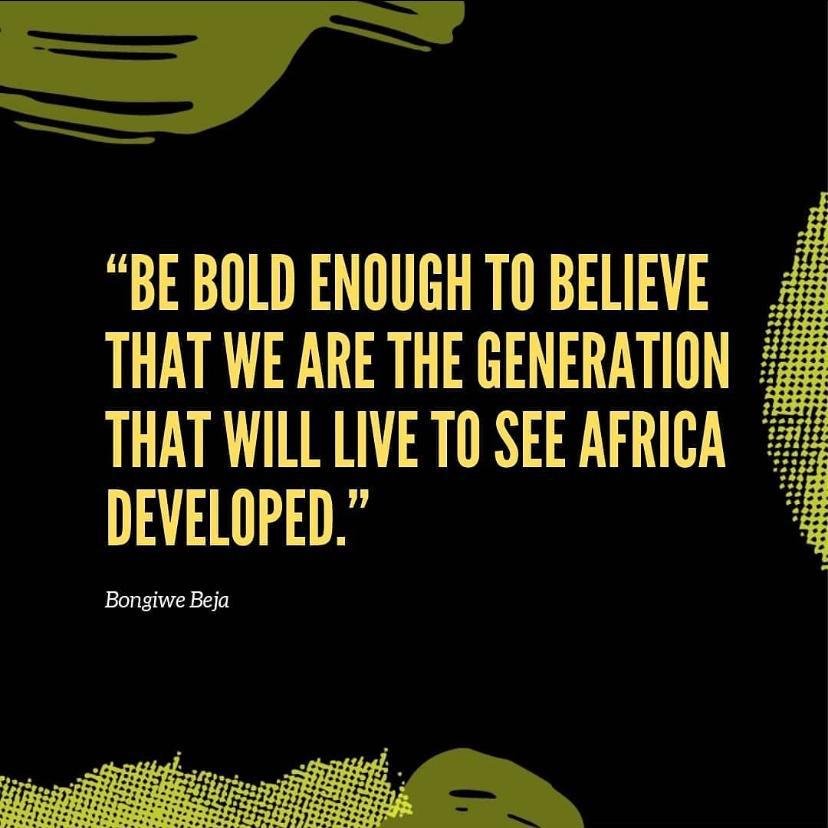“Nothing about us without us”
Why Women’s Month holds no sway for Bongiwe Beja-Ntsiko, and other stories
There once was a girl – the youngest of four siblings – who grew up in a family home in Umtata in the Transkei, which was then a self-governing territory or ‘homeland’ of South Africa. So much of her sheltered world made sense to her: everyone seemed to fit in and play together in the school playground; her parents – both medical doctors – were pillars of the community who ran a successful surgery, served as Anglican priests, and later started a local restaurant and delivery service. All her potential role models, whether teacher, lawyer, or accountant, looked just like her. Bongiwe knew no different. She understood simply that “humans were humans”.
As an adolescent, while attending high school in post-apartheid South Africa, Bongiwe stumbled across a quote by Nelson Mandela which resonated with her deeply: “My respect for human beings is based not on the colour of a man’s skin nor authority he may wield, but purely on merit.”
This ethos was carried with her after matric to her first years of study at the University of Cape Town, where she was pleasantly surprised to see a diverse mix of capable students represented.
It was when she entered the investment industry, that Bongiwe started noticing harsh realities such as pay gaps based on race and gender, and that career progression appeared to come most readily to those who happened to be white and male. “I started to question if I was really suited to the industry,” she notes. “What were the chances of me succeeding here as a young black woman?”
So Bongiwe drew on some of her childhood experiences and learnings for guidance. She remembered the life skills gained when helping out in her parents’ businesses, and while job shadowing at the Umtata Child Abuse Resource Centre (UCARC) in Grade 11. She recalled how her parents advocated for the sick and the weak in the community, becoming voices for the voiceless. She listened to a similar call within herself, to make a difference in people’s lives, and realised that she needed further education in order to move out of asset management and into a more personally fulfilling sector.
The rest, as they say, is history. Bongiwe studied her Masters in Development Finance at UCT’s Graduate School of Business, and was soon employed as Business Development and Strategy Lead at the Youth Employment Service, an initiative launched by President Ramaphosa to curb youth unemployment in South Africa. In her subsequent role as General Manager at Silulo Ulutho Technologies, she helped create significant impact in township and rural communities across South Africa, working to address the digital divide. During her three-year role as Southern African Region Community Champion in the Global Shapers Community (a WEF initiative), she provided support to 20 community-based hubs, each driving projects to develop young people on the continent.
Bongiwe is currently the Executive Director of Youth Bridge Trust, a Public Benefit Organisation with a mission to equip Africa’s unemployed youth with the knowledge, skills and confidence they need to fulfil their potential in the future of work, while contributing to the advancement of the continent’s Green Economy.
Bongiwe recalls an interview, early in her career, in which she was asked what message she would share with the country’s youth. Her response was as follows: “Be bold enough to believe that we are the generation that will see Africa developed.”
“I wake up every day to make this vision a reality,” she says now, “starting at the community level, then within the country and finally the continent. This is how I play my role in changing the narrative for Africa.”
It's hardly surprising, then, that Bongiwe was voted the 11th Most Influential Young South African by Avance Media in 2018, winning the Overall Category of Personal Development and Academia.
And in 2022, Mail & Guardian named her among its Top 200 Young South Africans in recognition of her work.
As such an influential and successful young woman, one might expect Bongiwe to be a vocal supporter of occasions like Women’s Month, speaking out on behalf of women, and particularly women of colour. This is not the case, as it turns out. “If we make the narrative about one binary gender, just one group, what about all the others that need attention as well? Do we alienate them?” she asks.
What matters more to Bongiwe personally is ensuring that decisions are no longer made on behalf of groups, like the youth, without their active participation and engagement in the decision-making process. “Youth must be central to youth solutions,” she states. “They must have a seat at the table.”
She leaves us with a slogan that was initially coined by the disability rights movement: “Nothing about us without us.” It’s a phrase that would not be out of place on a placard at a youth-led protest. The time for Africa’s awakening is now, according to Bongiwe. And she’s passionate about her role as advocate – as activist, even – to ensure that “the giant awakes”.

